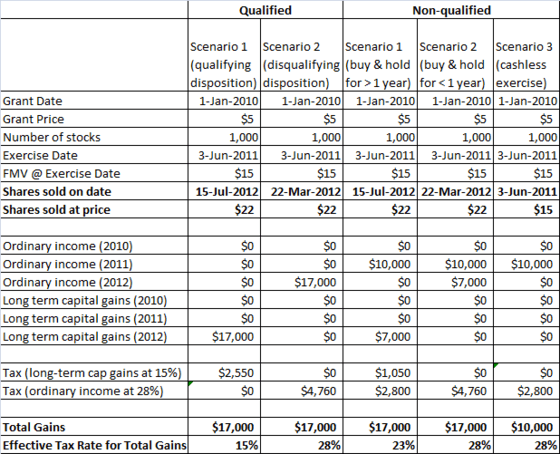Incentive stock option vs. non qualified stock option

Let us try to clear up some confusion. Stock option grants are the lifeblood of Capshare — I estimate that about 3 out of every 5 people I help switch over to Capshare do so because keeping track of options in excel was simply no longer a viable option for them.
Equity Sharing vs Profit Sharing | Equity Sharing
Frequently, I am asked about the differences between ISOs and NSOs. Secondly, for the above reason, this article will not be all inclusive, but will cover the basics and focus on how Capshare can help. With those disclaimers stated, let us dive in.
ISOs have many tax advantages over NSOs for employees, but with these advantages come stricter rules in regards to the granting of ISOs. Any number of NSOs can be granted to anybody employee or non-employee.
There are no restrictions on what the strike price can be, but any strike price less than than the current fair market value FMV of the stock will be considered ordinary compensation not capital gains. However, this compensation is recorded as it vests.
There are also some penalty taxes that may apply, and for this reason, it is common to grant NSOs with a strike price at least equal to the fair market value. Upon the exercise of an NSO, an individual is expected to show ordinary income equal to the value of the stock at the time of exercise minus the value at the time of grant.
What are Non-qualified Stock Options?
Any future gains from an NSO due to the sale of the stock would then be treated as long term or short term capital gains, depending on how long the stock was held after the exercise. The biggest benefit of holding an ISO is that, upon exercise, an ISO does not trigger a taxable event but it does count towards the Alternative Minimum Tax.
Incentive Stock Options vs. Nonqualified Stock Options – A General Summary | GT Israel Law Blog
Any gains upon the sell of the stock will be counted as long term capital gains if the asset is held for at least 2 years after the date of grant and 1 year after the date of exercise. The Cap Table Auditor does make one assumption that you will want to manually check.
In Capshare, you will want to perform a transaction on the offending option grant, transferring shares from the ISO to a new NSO.
Hopefully, this post has cleared up any confusion surrounding ISOs and NSOs. If you would like to see a more detailed breakdown between ISOs and NSOs, click here.

Meld Valuation - What is Phantom Stock? Why RSUs Restricted Stock Units Could be Better Than Stock Options At Your Private Company - Capshare Blog.
Resources Equity Guide for Founders DIY A Tool How to Choose an Equity Solution About Contact Us More Capshare Home Capshare Pricing Request a Demo.
There are three major differences: Manage All Your Equity in 1 Place Manage your cap table, issue shares, analyze funding rounds, and automate all your equity without getting bogged down in spreadsheets and paperwork.

Recent Posts A Process: Best Practices and What to Expect Startup Ideas: